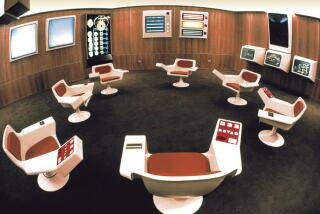Planting Net Seeds in Third World
- Share via
HONOLULU — It was the last day of the Internet Society’s workshop on developing countries, and Vint Cerf, legendary architect of the computer network, was giving his benediction.
“What we have done here is plant the seeds,” intoned Cerf, surveying an audience of 150 computer jockeys from 80 of the world’s poorer nations. “I expect great things from each one of you as you go back and create your part of the Internet.”
Then came the question from Marwan Tarazi, head of the computer network at Birzeit University in Palestine:
“In many of our countries, the implementation of technology is not properly balanced with socioeconomic development. Do you have anything to assist people with that?”
Um. No, not really.
Nor should he, necessarily. Cerf, like most members of the Internet Society, represents a big corporation whose main concern in spreading the Internet is making money. MCI, he notes, believes half of all its revenue will come from data communications by 1999.
The telecommunications and computer executives gathered at the ritzy Sheraton Waikiki for the Internet Society’s annual conference last week see the developing world as potentially big business. Which is why they helped transport a bunch of Third World computer geeks to Hawaii and put them up two to a room at the Pagoda (let’s just say it’s not the Sheraton) Hotel to be trained in “Internetworking” for a week.
Other sponsors included the U.S. State Department, the Internet Assn. of Japan and NATO, which paid for 30 citizens of various former Soviet republics to come so that “the scientists there would have the tools to communicate with the West,” a NATO representative explained.
The government and corporate entities that have traditionally dominated the international economy tend to see the deployment of the Internet in the developing world in terms of their own interests. And the government-run telephone monopolies in many less developed nations are often anxious--for a variety of reasons--to control its use as well.
But the Internet is a chameleon-like tool. Investing in information infrastructure is different than sinking capital into fruit plantations or even high-tech silicon chip factories: Electronic information is not a commodity that’s easy to control once people get ahold of it, and its potential for social and economic transformation is enormous.
Many of the workshop’s participants, and the volunteer instructors, believe that once the infrastructure is in place, developing nations will turn the Internet to their own economic, social and political uses.
Thus Jorge Calvo-Drago, a Guatemalan exile who displays scars on his wrists that he says were inflicted by his country’s government, is now involved in establishing a community center for Internet access in El Salvador.
“It’s a different kind of work,” Calvo-Drago says, “but I think it is very important.”
“I do it as political action,” says Randy Bush, a workshop instructor who runs the Network Startup Resource Center, a Portland, Ore.-based nonprofit organization. “It beats blowing up the BofA.”
Indeed, the Internet’s power as a political tool has been well documented in its use during the 1989 student rebellion in China and Zapatista uprising in Mexico.
But as the network radiates into the developing world, businesses as well as activists see the inexpensive dissemination of information as a potentially revolutionary tool.
“Ethiopia has the potential to feed Africa,” said Thomas Musa of Addis Ababa. “Our problems are the problems of mismanagement and war. Business information, agricultural information and medical information are critical to the development of the country, and the Internet can help us with that.”
Possible applications range from receiving up-to-date trade information from around the globe to distributing news, both international and domestic, that is otherwise impossible to attain. And the network has already plugged some of the “brain drain” developing nations have experienced, enabling computer scientists like Sana Bellamine to return to her native Tunisia without feeling cut off from the rest of the world.
It’s a slightly different take on the Internet than is found in the first world, where much ado is made over the network’s ability to market movies and sell T-shirts, with secure encryption no less. Perhaps it is idealistic.
But in order to see the Internet’s full potential impact, it helps to understand that as of now, the computer network invariably described as the “global Internet” is not in fact all that global.
Most American companies have faster connections than entire countries in the developing world. And the cost of even slow connections are often many times higher.
That is changing fast. And if the determination of the workshop participants is any indication, the Internet will continue to spread through developing nations at a rapid rate.
Some scoff at the pursuit of technical equality in nations where such basic needs as food and shelter go unmet for large portions of the population.
But, says Izzeldin Mohammed Osman of the Sudan, “Information is power, and this is one way information can be accessed quickly and less expensively.”
“I could be making a lot more money working for a private company,” says Bellamine, who earns about the equivalent of $7,000 a year setting up a network in Tunisia. “But I would do anything to help my country, and I think there is a lot to do in this area now.”
Amy Harmon is a Times staff writer.
(BEGIN TEXT OF INFOBOX / INFOGRAPHIC)
Hosts With the Most
While many nations are connected to the Internet, the vast majority of host computers are in North America and Western Europe. Number of host computers as of January: North America: 3,372,551 Western Europe: 1,039,192 Pacific Rim: 192,390 Asia: 151,773 Eastern Europe: 46,125 Africa: 27,130 Central and South America*: 14,894 Middle East: 13,776
* Figures for January, 1994
Source: Internet Society






